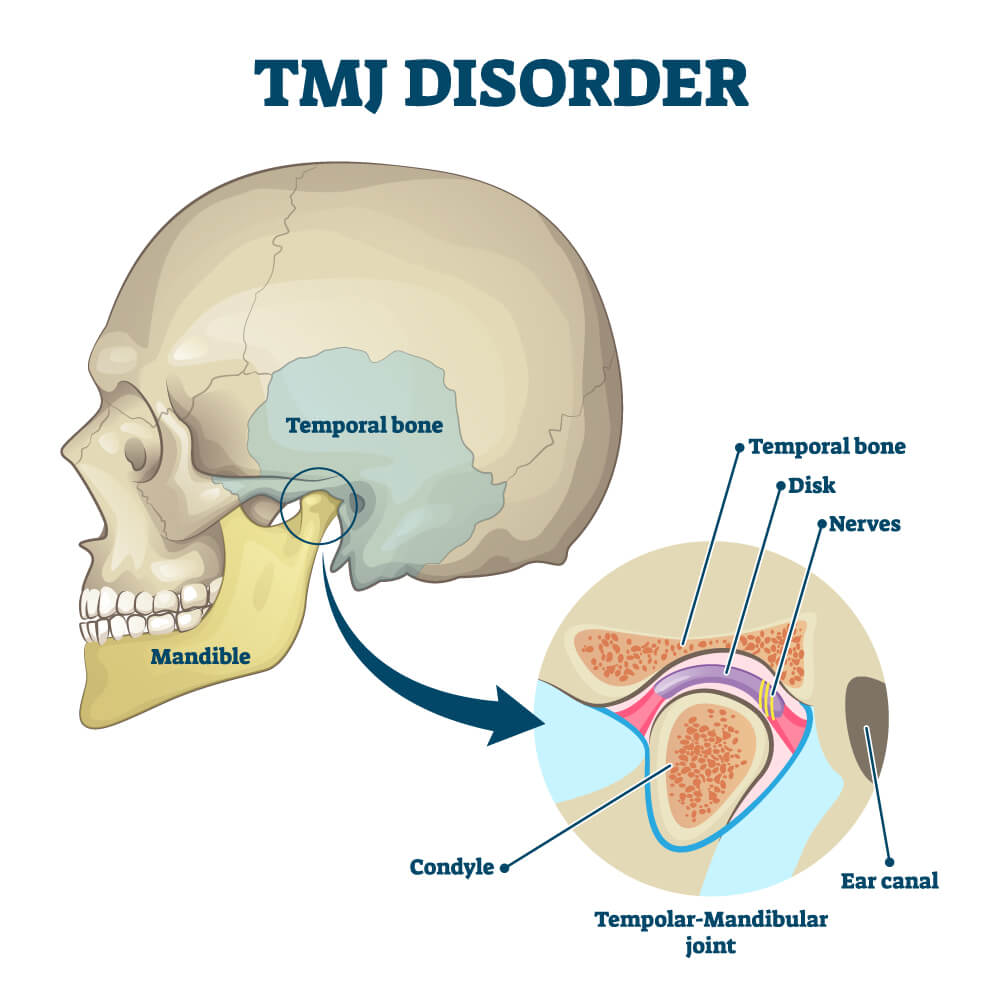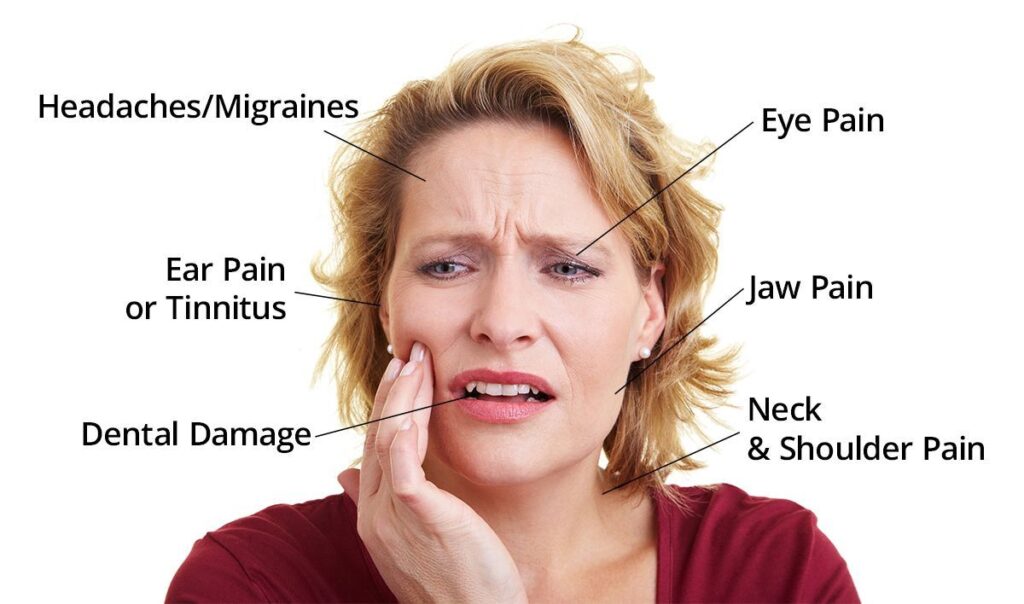TMJ Disorder Treatment: How Our Dental Care Team Provides Relief
At People’s Dental Care we offer best treatments for TMJ disorder to keep your jaw healthy. Millions of people suffer from Temporomandibular Joint Disorder (TMJ) which causes pain discomfort and makes it hard to move the jaw. This situation can disrupt everyday tasks such as eating talking and even sleeping.
Our TMJ specialist provides customized treatments for TMJ disorders to improve your oral health and quality of life.
TMJ disorder also called Temporomandibular Joint Disorder can have a big impact on how you live your life. This condition can make simple tasks like eating and even cause frequent headaches.
We specialize in offering tailored solutions to treat temporomandibular joint dysfunction treatments effectively and bring relief to our patients.

Understanding TMJ: What Is It?
What is the Temporomandibular Joint?
The temporomandibular joint works like a sliding hinge that helps your jaw move easily when you talk chew or yawn. The structure is made up of bones cartilage and a disc that helps to absorb shocks when we move.
What is TMJ Disorder?
TMJ disorder happens when there is a problem or misalignment in the jaw joint. It can lead to pain feeling stiff and even hearing clicking noises. TMJ problems can get in the way of everyday activities so it’s important to identify and treat them early.
Symptoms of TMJ Disorder
- Jaw pain or tenderness.
- Hearing clicking or popping noises when you open your mouth.
- Difficulty chewing or speaking.
- Locking of the jaw.
- Headaches or earaches.
Causes of TMJ Disorder
TMJ disorders can stem from various factors, including:
Bruxism (Teeth Grinding): Constant grinding can cause the joints and muscles to become worn out over time.
Arthritis: Osteoarthritis or rheumatoid arthritis can impact the TMJ directly.
Injury or Trauma: Getting hit in the jaw can cause it to become out of line.
Stress: Long-term stress can lead to clenching or tightening of the jaw.
Structural Issues: Issues with how your jaw is positioned due to genetics or how it developed.

Why TMJ Treatment is Essential?
TMJ disease can lead to serious problems if not taken care of properly. They don’t just cause pain but can get worse over time.
Best doctors for TMJ can easily identify these symptoms may include ongoing tmj headaches trouble with eating and lasting jaw problems. Getting the right treatment helps you move your mouth better stops pain and keeps your teeth healthy.

TMJ Treatment Options at Our Dental hospital in Guntur
1.Comprehensive Diagnosis
Our dental clinic has the top dentist in treating TMJ disorders for different patients. We start by carefully looking at things in great detail. This involves looking at your past medical records checking any imaging tests you may have had and evaluating how much your jaw can move.
- X-rays to visualize the joint structure.
- CT scans for detailed imaging
- MRI scans for soft tissue assessment
- We aim to find the main reason before making a personalized treatment plan.
2.Custom Splints and Mouth guards
Personalized appliances can help stop grinding and clenching which lessens strain on the TMJ. These devices can also assist in adjusting the position of the jaw to improve its performance.
3.Physical Therapy for TMJ
Our trained therapists lead patients through specific exercises to help them improve.
–>Strengthen jaw muscles.
–>Improve joint mobility.
–>Reduce stiffness and tension.
Physical therapy is a treatment that doesn’t involve surgery and can provide lasting pain relief.
4.Medication Management
We may recommend medication for pain and swelling.
Muscle relaxants, Anti-inflammatory drugs, Low-dose antidepressants (for stress-induced cases)
Doctors keep a close eye on medications to make sure they are safe and work well.
5.Advanced Dental Procedures
In serious situations dental treatments such as braces or fillings can fix problems with how your teeth come together and how your jaw lines up.
6.TMJ Surgery
Surgery is not done often but it is needed in cases of severe joint damage or ongoing pain. The treatment options may involve using arthroscopy or open-joint repair depending on how serious the condition is.
Preventing TMJ Disorders
Our tmj doctor in guntur Practicing meditation and yoga can help decrease teeth grinding caused by stress. Eating hard foods can put pressure on your jaw joint. Choose to eat softer foods when experiencing flare-ups. Slouching can impact how your jaw lines up so make sure to keep your head straight when working or using your phone. If you grind your teeth at night a mouth guard made just for you can help protect your teeth and jaw joint.
Why Choose people’s dental care for TMJ Disorder Treatment?
We are committed to giving top-quality dental care and treatments for TMJ. Patients trust us because we have a good reputation.
Experienced tmj Specialists: Our team knows a lot about diagnosing and treating TMJ disorders.
Advanced Technology: We use the latest tools to accurately diagnose and treat patients.
Patient-Centric Approach: Each treatment plan is customized to fit the specific needs of each person.
The best & top doctor for TMJ can help treat the painful TMJ disorder which can make life difficult but it doesn’t have to take over your life. At People’s we promise to help you feel better by creating special treatment plans that work just for you. Our skilled dental team is available to help you whether you have slight discomfort or serious symptoms.

FAQ’S
1.What are TMJ treatment guidelines?
Treatment for Temporomandibular Joint (TMJ) disorders involves a personalized, step-by-step approach tailored to the severity and cause of the condition. The key guidelines include like Accurate Diagnosis, Non-Invasive Therapies, Medication Management, Lifestyle Modifications, Dental Corrections, Surgical Intervention.
2. What are TMJ treatment exercises?
TMJ treatment exercises are easy movements that help make the jaw muscles stronger improve how well the joint moves and reduce pain from temporomandibular joint disorders. Jaw Relaxation Exercises, Chin Tucks, Goldfish Exercises, Side-to-Side Jaw Movement, Resistance Exercises, Tongue-Up Exercise, Forward Jaw Movement,
3.Tmj treatment cost in Guntur?
The price of treating TMJ (Temporomandibular Joint) in Guntur may change based on the treatment type and how serious the condition is.
4. What is the best way to treat TMJ?
The treatment for Temporomandibular Joint Disorder (TMJ) will vary depending on how serious the condition is what is causing it and what the patient specifically requires. Typically a mix of treatments that don’t involve surgery making changes to your daily habits and medical procedures can produce good outcomes.
5.How much is TMJ treatment?
The price of treating TMJ (Temporomandibular Joint) issues can be different for each person. It depends on how serious the problem is and what kind of treatment is needed.
6.Who to see for tmj treatment?
If you have problems with your jaw joint called TMJ disorders it’s best to see experts who know a lot about diagnosing and treating issues with the jaw face muscles and joints.
7. How long is tmj treatment?
The length of time needed to treat TMJ disorder can differ based on how serious the condition is the type of treatment used and the patient’s overall health.
8. Acupunture TMJ treatment protocols?
Acupuncture treatment plans for Temporomandibular Joint (TMJ) problems. These guidelines aim to help manage pain enhance movement and tackle root issues such as stress or muscle imbalances.
9.Can TMJ disorder go way on it’s own?
TMJ disorder may get better by itself but it depends on what is causing it and how serious it is. If your symptoms continue get worse or start affecting your daily routine a lot it’s important to see a healthcare provider for a correct diagnosis and a treatment plan that fits your needs.
10.Can chiropractic treatment help with TMJ dysfunction?
Certainly chiropractic care can be beneficial for TMJ (Temporomandibular Joint) issues especially when the problem is caused by muscle or bone alignment issues. Chiropractors work on easing pain making joints work better and dealing with things like how you sit or tight muscles that might be causing the pain.
11. Is Tmj disorder bad?
TMJ disorder is not necessarily “bad ” but it can greatly impact your quality of life depending on how severe the symptoms are and what is causing them. While slight cases can get better by themselves or with little help more serious cases can cause long-lasting pain and problems with daily activities.
12.Are braces used to treat TMJ disorder?
Certainly braces may be utilized in treating TMJ disorder, but how well they work depends on what is causing the condition. TMJ disorders can happen when the teeth or jaw are not lined up properly, and braces can fix these problems.
13.Can Botox be used to treat TMJ disorder?
Yes, Botox can help with TMJ disorder by treating symptoms caused by tense or overactive muscles in the jaw joint. Botox, approved by the FDA, is a type of neurotoxin that can relax muscles for a short time. This can ease pain from TMJ and make your jaw work better.
14. Is TMJ disorder permanent?
TMJ disorder may not last forever but how long it lasts and how bad it gets can change depending on what’s causing it and how it’s treated. Many individuals experience TMJ disorder as a temporary issue that gets better with the right treatment and changes in how they live.
15. TMJ disorder is curable?
TMJ disorder can usually be controlled and treated well, but whether it can be completely cured depends on what is causing it and how serious it is. Proper treatment can help many people feel much better and use their jaw normally again. Some people may need ongoing care to manage long-term symptoms.
16. What to do for TMJ disoder?
Having a temporomandibular joint (TMJ) disorder can make your jaw face or ears hurt and make it hard to chew or open your mouth. Here are steps you can take to manage and treat TMJ disorder. Self-Care Measures, Lifestyle Modifications, Medications, Dental Approaches, Professional Treatments.
17. What types of treatment are available for TMJ?
Many treatments can help with Temporomandibular Joint (TMJ) disorders. These treatments vary from simple self-care steps to getting help from a healthcare professional. Home and Self-Care Treatments, Medication, Dental and Orthodontic Treatments, Physical Therapy, Advanced Medical Treatments, Alternative and Complementary Therapies, Lifestyle Adjustments and Stress Management.
18.What is the 3 finger test for TMJ?
The 3-Finger Test is a basic way to see how well your jaw can move and to look for signs of TMJ issues.
19. What tests confirms TMJ?
To diagnose TMJ disorder best doctors may use a mix of clinical evaluations and diagnostic test may be used.
20. How to deal with chronic TMJ?
Treating chronic TMJ disorder involves a thorough plan that aims to control symptoms lessen sudden worsening of pain and enhance jaw movement gradually.
21. Can chiropractic treatment help with TMJ dysfunction?
Yes chiropractic care can sometimes improve TMJ dysfunction. Chiropractors help to make sure your spine and muscles are in the right position. They use specific methods to fix problems in the jaw joint and the muscles around it.
22. What are the causes and treatments for temporomandibular joint disorder (TMJ)?
Temporomandibular Joint Disorder (TMJ) is a problem that affects the joint in your jaw and the muscles around it. It may cause pain limited movement and discomfort in the jaw region. Causes of TMJ Disorder such as muscle tension and Stress, Joint Problems, injury or Trauma, Dental or Bite Issues, Structural Abnormalities. Treatments for TMJ disorder like self-care and lifestyle changes, Medications, Dental and Orthodontic Interventions, Physical Therapy, Advanced Medical Treatments.

